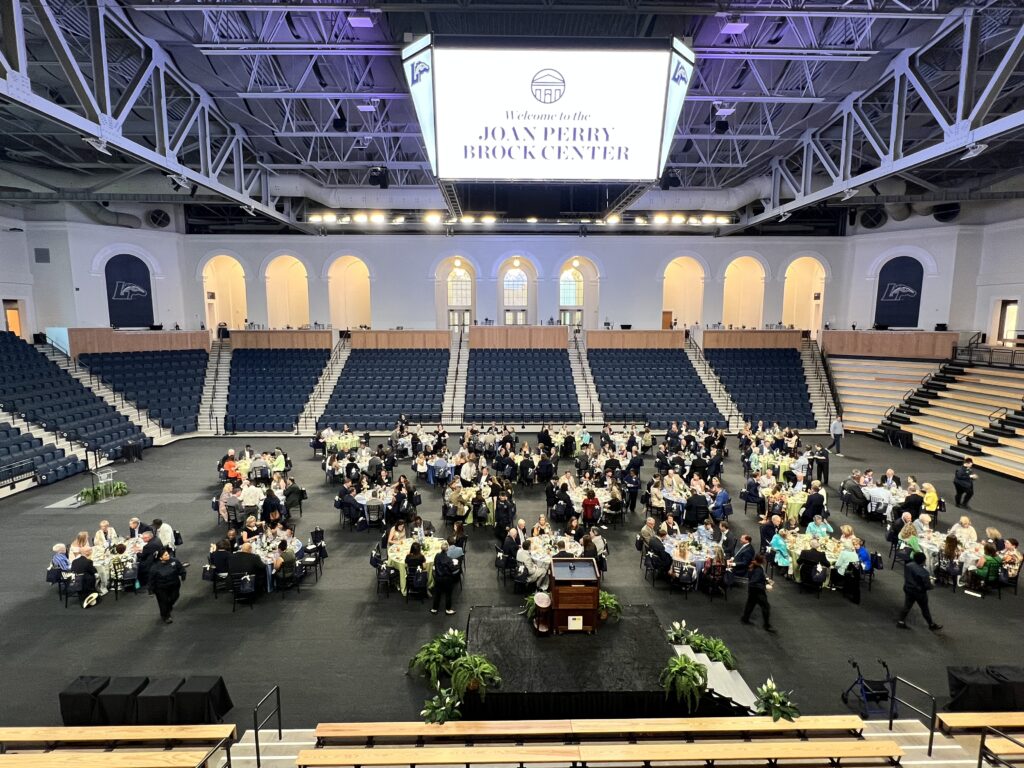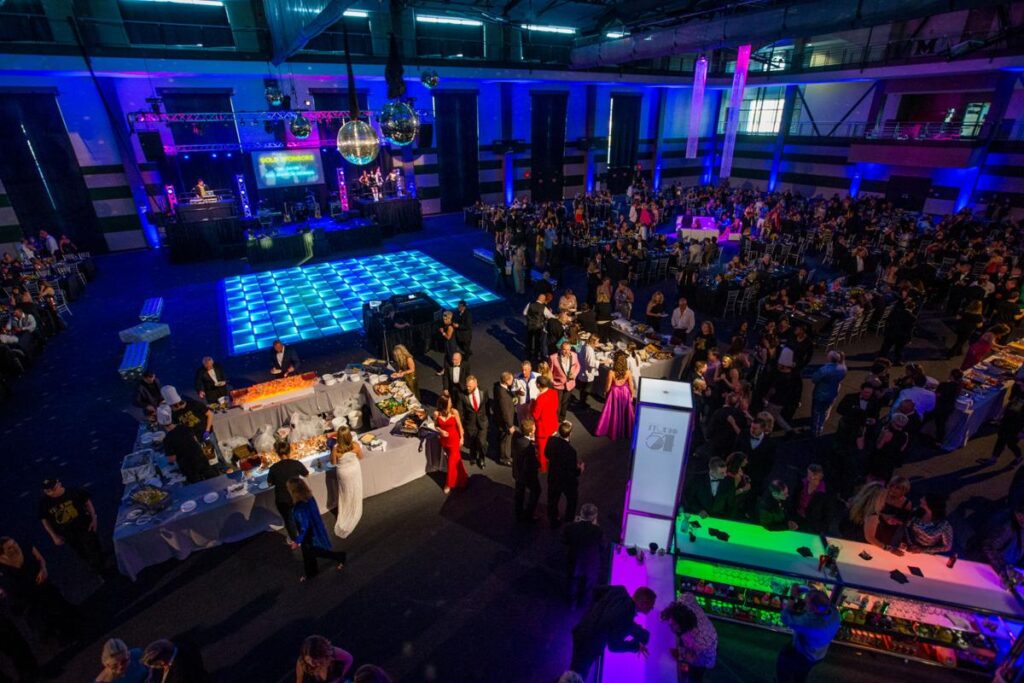Management Partnerships Bring Fresh Perspectives and Innovative Solutions
 Higher education institutions are navigating an increasingly complex financial and operational landscape. Budget constraints, shrinking resources, and rising expectations for self-sustaining operations are pushing institutions to rethink how they manage their conference and event services.
Higher education institutions are navigating an increasingly complex financial and operational landscape. Budget constraints, shrinking resources, and rising expectations for self-sustaining operations are pushing institutions to rethink how they manage their conference and event services.
Today’s higher education professionals are being asked to do more with less. They’re managing a team with fewer resources, addressing logistical challenges, navigating last-minute crisis management, and—on top of it all—being tasked with enhancing event operations to support institutional goals. Simultaneously, evolving internal and external customer expectations require high-level expertise in event planning, sales, marketing, and operations—skill sets that may not exist within the institution’s existing structure.
Challenges in Campus Event and Conference Service
Given these challenges, universities must solve two critical issues:
- Resource Constraints – How can institutions maximize event services without overburdening existing staff and budgets?
- Technical Expertise – How do universities ensure events are marketed, staffed, and executed with the level of professionalism and efficiency needed to stay competitive?
Institutions must decide whether to maintain an in-house management model or engage a management partner for event and conference services to address these challenges. As a leader in campus center management, CENTERS has worked with institutions nationwide to develop event management models that align with institutional goals.
This article explores the fundamental differences between these two models, key differentiators to consider, and how universities can make the best decision for their unique needs.
In-House vs. Engaging an Event Management Partner
Managing Event Services In-House
Universities that self-operate event operations retain direct control over all aspects of scheduling, staffing, marketing, and logistics. This approach ensures seamless alignment with institutional goals and allows greater control over event programming. For universities that focus primarily on internal programs and events for student organizations and the university community, this can be an efficient solution.
However, for colleges and universities with a new or ongoing need to prioritize revenue-generating external rentals, maintaining an effective in-house operation requires substantial investments in specialized sales and marketing personnel, infrastructure, and technology to remain competitive in the evolving event marketplace.
One of the biggest challenges of in-house management is resource allocation. Institutions must dedicate significant staffing and operational budgets to sustain a team with expertise in sales, event production, vendor coordination, customer experience, and risk management—areas that often fall outside the core competencies of higher education professionals. Additionally, staffing levels may be difficult to scale with fluctuating event demand, often leading to inefficiencies or operational strain during peak periods.
Further, marketing and event outreach remain common pain points. Without a dedicated, commercially-driven sales and marketing team, many universities struggle to reach external clients and fully optimize facility use. As a result, spaces may go underutilized, and potential revenue opportunities, sponsorship partnerships and engagement opportunities are lost.
Benefits of Partnering with Third-party Operators
Engaging an event management partner allows institutions to tap into industry-leading expertise, established networks, marketing expertise, and economies of scale. By leveraging professional management, universities can enhance operational efficiency, reduce administrative burden, and increase institutional impact without adding internal overhead.
A professional management firm brings the advantage of:
- Expert staffing and scalable workforce solutions – ensuring that event operations can efficiently expand and contract with seasonal demand.
- Sales and marketing expertise – leveraging industry networks, digital outreach strategies, and proactive engagement efforts to secure diverse bookings.
- Integrated marketing and outreach capabilities – providing strategic branding, targeted promotions, and campaign execution to drive event attendance and maximize facility usage.
- Streamlined operations – implementing best practices in scheduling, logistics, and vendor coordination to optimize space utilization, cross-functional synergies, and client experience.
For example, at Cleveland State University, CENTERS is currently implementing an optimized booking strategy to increase event space utilization and engagement. By employing a mission-aligned partnership model and leveraging industry networks, CSU is starting to secure a broader mix of events, strengthening its role as a community and institutional asset.
At Goucher College, after a complete assessment of current booked event KPIs against industry standards, the team strategized on a full-year rental calendar that optimized margin for third-party events, maintained key college partnerships for recruitment, and sought to recruit new clients to fully utilize the campus centers.
Sharing Commencement Best Practices that Maximize the Campus Experience
 One particularly impactful aspect of CENTERS’ event and conference services partnerships is its management of university commencements—a time-consuming but crucial milestone for institutions. CENTERS’ event planning expertise, combined with its network of managed locations and best practices, brings a fresh approach to this classic event, ensuring a seamless experience for graduates, families, and the university community.
One particularly impactful aspect of CENTERS’ event and conference services partnerships is its management of university commencements—a time-consuming but crucial milestone for institutions. CENTERS’ event planning expertise, combined with its network of managed locations and best practices, brings a fresh approach to this classic event, ensuring a seamless experience for graduates, families, and the university community.
Beyond full-service event management, CENTERS also supports institutions in managing facility rentals for external groups, helping universities optimize space utilization while maintaining alignment with their mission.
Best Practices for Summer Camps & School-Day-Off Camps
 Campus venues are valuable assets that can be maximized year-round. Many universities host summer camps and school-day-off camps as a way to serve the community while generating additional revenue. However, managing these programs requires careful scheduling, staffing, and coordination with other campus operations.
Campus venues are valuable assets that can be maximized year-round. Many universities host summer camps and school-day-off camps as a way to serve the community while generating additional revenue. However, managing these programs requires careful scheduling, staffing, and coordination with other campus operations.
CENTERS applies best practices across its network of managed locations to help universities structure scalable, efficient camp programming that aligns with institutional goals. By integrating event management strategies with existing campus facilities, CENTERS ensures that summer camps and school-day-off camps run smoothly while optimizing facility utilization.
For example, at multiple CENTERS-managed locations, standardized best practices for registration, staffing, marketing, and program execution have led to increased participation, streamlined operations, and improved overall experience for attendees and campus staff.
Enhancing Campus Conference Services with a Strategic Event Management Partner
Maximizing Campus Space Utilization
 Operating event services internally requires a significant financial investment in personnel, marketing, and facility maintenance. Universities often struggle with developing efficient pricing models and ensuring long-term sustainability due to limited staffing capacity and competing institutional priorities. Without a structured approach, event spaces may be underutilized or operate below their full potential.
Operating event services internally requires a significant financial investment in personnel, marketing, and facility maintenance. Universities often struggle with developing efficient pricing models and ensuring long-term sustainability due to limited staffing capacity and competing institutional priorities. Without a structured approach, event spaces may be underutilized or operate below their full potential.
An event management partner can utilize their expertise and knowledge to implement data-driven space utilization models, strategic marketing campaigns, and proactive engagement efforts to align event programming with institutional priorities. These third-party partners have established industry networks and the ability to attract diverse event types that complement a university’s mission.
For example, at Longwood University, CENTERS manages the Joan Perry Brock Center, a 3,000-seat arena that serves as both an athletic facility and a multi-purpose event venue. By implementing targeted outreach strategies and optimizing event logistics, the venue has attracted concerts, speaker series, and regional sports tournaments, increasing its role as a valuable asset for the university and surrounding community. Additionally, Longwood has hosted several high school sports tournaments, not only bringing in rental revenue but also introducing prospective students to the school.
As a result of their KPI analysis, the CENTERS @ Goucher College team renewed its focus on retaining its most valuable clients by fostering relationships with organizers. This resulted in a portfolio of recurring profitable and successful events and programs and mitigated the costs and risks of “one-and-done” programming by creating annual portfolio ‘pillars’ with multi-year contracts.
Operational Efficiency & Scalable Campus Center Management
 Universities often face staffing limitations, making it difficult to scale operations up or down to meet seasonal demand. In-house event teams must navigate hiring and training cycles, balancing full-time and part-time roles while ensuring service quality remains consistent.
Universities often face staffing limitations, making it difficult to scale operations up or down to meet seasonal demand. In-house event teams must navigate hiring and training cycles, balancing full-time and part-time roles while ensuring service quality remains consistent.
Event management partners offer scalable staffing models, allowing institutions to flex operations based on demand. Whether managing summer conference peaks or slower academic-year event schedules, outsourcing to an event management partner model ensures that staffing and operational costs align with institutional activity.
At Marshall University, CENTERS implemented a dynamic staffing solution that allowed the institution to scale event operations efficiently. During peak seasons, the team expanded to accommodate high event demand, while cost controls were maintained during slower periods. This adaptive model not only optimized staffing expenditures but also ensured a consistent, high-quality experience for event attendees while aligning with Marshall’s mission.
Additionally, CENTERS’ enterprise approach offers universities a flexible part-time workforce trained in customer service and integrated marketing support, with the ability to adapt across event venues. This ensures consistency and professionalism at all campus events while reducing operational redundancies. In the Enterprise Management Model, particularly at CSU, the part-time workforce is also cross-trained in various operations, including the Health and Recreation Center, the Student Center, and Conference & Event Services, as well as in key universal disciplines like risk management, maintenance, and custodial services. This comprehensive training enables staff to seamlessly support and contribute to multiple operations while maintaining high standards and practices across the board.
At Mylan Park, CENTERS has leveraged its expertise to optimize facility rentals for community programs, large-scale events, and external bookings, ensuring that these assets generate revenue while serving both university and local needs.
The Future of Campus Center Event Management
By evaluating factors such as budget constraints, available internal expertise, alignment with institutional mission, and operational capacity, institutions can make an informed decision that supports their long-term vision for conference and event services.
About the Authors:
 Kaia Greene is Director of Events and Conference Services for CENTERS @ Goucher University. With over two decades of experience in event management, Ms. Greene is a seasoned professional known for orchestrating successful events ranging from 400 to 20,000+ attendees and participants. Her passion lies in navigating the intricate puzzle of event planning, always keeping an eye on the big picture while meticulously managing all the moving parts. To do so, she possesses a creative resourcefulness that enables her to find innovative solutions for any unexpected challenges that may arise. Ms. Greene began her career with Disney Sports Attractions in 2000, where she dedicated more than 12 years to mastering the art of event management and coordination She also shared her expertise with organizations such as the National Law Enforcement Officers Memorial Fund, the City of Kissimmee, and Orange County Public Schools. As a valued member of the CENTERS team, she brings her extensive experience, commitment to excellence, and leadership to every event she oversees. Ms. Greene holds a bachelor’s degree from Dartmouth College and a master’s degree from the University of Massachusetts Amherst, as well as multiple event management certifications.
Kaia Greene is Director of Events and Conference Services for CENTERS @ Goucher University. With over two decades of experience in event management, Ms. Greene is a seasoned professional known for orchestrating successful events ranging from 400 to 20,000+ attendees and participants. Her passion lies in navigating the intricate puzzle of event planning, always keeping an eye on the big picture while meticulously managing all the moving parts. To do so, she possesses a creative resourcefulness that enables her to find innovative solutions for any unexpected challenges that may arise. Ms. Greene began her career with Disney Sports Attractions in 2000, where she dedicated more than 12 years to mastering the art of event management and coordination She also shared her expertise with organizations such as the National Law Enforcement Officers Memorial Fund, the City of Kissimmee, and Orange County Public Schools. As a valued member of the CENTERS team, she brings her extensive experience, commitment to excellence, and leadership to every event she oversees. Ms. Greene holds a bachelor’s degree from Dartmouth College and a master’s degree from the University of Massachusetts Amherst, as well as multiple event management certifications.
 Matt Schmiedl has more than 20 years of experience in marketing and graphic design working in a variety of industries and sectors, most notably higher education and publishing. He has been working with CENTERS, LLC for more than a decade at Cleveland State University (CSU), leading marketing and business development on behalf of the University Recreation and Wellbeing department. He has developed and launched a number of initiatives to catalyze business growth and implemented new marketing strategies to build engagement with both the CSU and Cleveland communities. Most recently, Mr. Schmiedl was tapped to lead Enterprise marketing efforts for CENTERS as he brings his marketing expertise to new and existing CENTERS’ clients. Matt is a nine-time NIRSA Creative Excellence Award recipient, the recipient of the CENTERS Quest for X Award in 2017, and the winner of an APEX Award of Excellence and Magnum Opus Honorable Mention Award, both in 2011.
Matt Schmiedl has more than 20 years of experience in marketing and graphic design working in a variety of industries and sectors, most notably higher education and publishing. He has been working with CENTERS, LLC for more than a decade at Cleveland State University (CSU), leading marketing and business development on behalf of the University Recreation and Wellbeing department. He has developed and launched a number of initiatives to catalyze business growth and implemented new marketing strategies to build engagement with both the CSU and Cleveland communities. Most recently, Mr. Schmiedl was tapped to lead Enterprise marketing efforts for CENTERS as he brings his marketing expertise to new and existing CENTERS’ clients. Matt is a nine-time NIRSA Creative Excellence Award recipient, the recipient of the CENTERS Quest for X Award in 2017, and the winner of an APEX Award of Excellence and Magnum Opus Honorable Mention Award, both in 2011.
